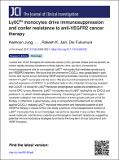Ly6C[superscript lo] monocytes drive immunosuppression and confer resistance to anti-VEGFR2 cancer therapy
Author(s)
Jung, Keehoon; Heishi, Takahiro; Khan, Omar Fizal; Kowalski, Piotr S; Incio, Joao; Rahbari, Nuh N.; Chung, Euiheon; Clark, Jeffrey W.; Willett, Christopher G.; Luster, Andrew D.; Yun, Seok Hyun; Langer, Robert S; Anderson, Daniel Griffith; Padera, Timothy P.; Jain, Rakesh K.; Fukumura, Dai; ... Show more Show less
DownloadPublished version (1.993Mb)
Terms of use
Metadata
Show full item recordAbstract
Current anti-VEGF therapies for colorectal cancer (CRC) provide limited survival benefit, as tumors rapidly develop resistance to these agents. Here, we have uncovered an immunosuppressive role for nonclassical Ly6C lo monocytes that mediates resistance to anti-VEGFR2 treatment. We found that the chemokine CX3CL1 was upregulated in both human and murine tumors following VEGF signaling blockade, resulting in recruitment of CX3CR1+Ly6C lo monocytes into the tumor. We also found that treatment with VEGFA reduced expression of CX3CL1 in endothelial cells in vitro. Intravital microscopy revealed that CX3CR1 is critical for Ly6C lo monocyte transmigration across the endothelium in murine CRC tumors. Moreover, Ly6C lo monocytes recruit Ly6G + neutrophils via CXCL5 and produce IL-10, which inhibits adaptive immunity. Preventing Ly6C lo monocyte or Ly6G + neutrophil infiltration into tumors enhanced inhibition of tumor growth with anti-VEGFR2 therapy. Furthermore, a gene therapy using a nanoparticle formulated with an siRNA against CX3CL1 reduced Ly6C lo monocyte recruitment and improved outcome of anti-VEGFR2 therapy in mouse CRCs. Our study unveils an immunosuppressive function of Ly6C lo monocytes that, to our knowledge, has yet to be reported in any context. We also reveal molecular mechanisms underlying antiangiogenic treatment resistance, suggesting potential immunomodulatory strategies to enhance the long-term clinical outcome of anti-VEGF therapies.
Date issued
2017-07Department
Massachusetts Institute of Technology. Department of Chemical Engineering; Harvard University--MIT Division of Health Sciences and Technology; Koch Institute for Integrative Cancer Research at MITJournal
Journal of Clinical Investigation
Publisher
American Society for Clinical Investigation
Citation
Jung, Keehoon et al. "Ly6C[superscript lo] monocytes drive immunosuppression and confer resistance to anti-VEGFR2 cancer therapy." Journal of Clinical Investigation 127, 8 (August 2017): 3039-3051 © 2017 American Society for Clinical Investigation
Version: Final published version
ISSN
0021-9738
1558-8238